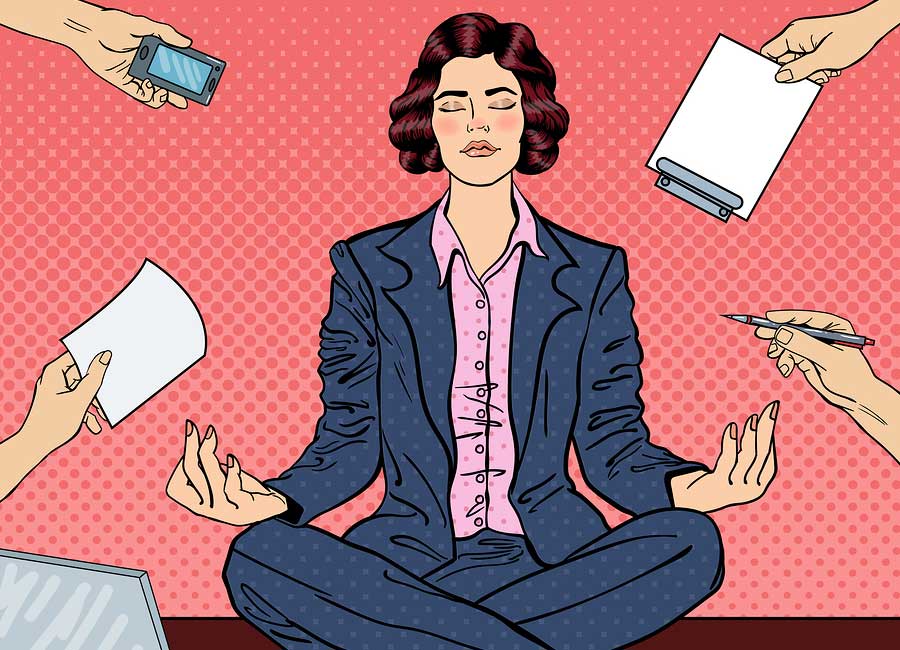The good news is that reducing stress can be easier than you think, according to Dr. Romie Mushtaq, a nationally known physician who helps people manage stress by using Western medicine and Eastern wisdom. She’s been through stressful times herself, having survived career burnout and life-saving surgery before traveling the world learning yoga and mindfulness techniques.
Jeanne Thompson recently interviewed Dr. Romie. Dr. Romie was just back from a restorative week’s vacation, during which she followed a daily routine of four hours of meditation in the morning and four hours of yoga in the afternoon. The break is helping her focus on writing her first book.
Q: What three things can people do to reduce stress?
Dr. Romie: When we’re faced with acute stress, the best advice I can give is:
- Step away from what’s causing you stress, even if it’s just for three minutes.
- Take a few deep breaths. When you take deep, purposeful inhales and exhales, you’re calming the stress center down in the brain.
- Focus your mind on something that brings pure, unconditional joy. It may be a memory of a loved one or an experience you had. Those sights and sounds can stimulate a different part of your brain that is wired for happiness. It helps you shift your mindset before you go back to cope with whatever was stressing you out in the first place.
The order in which you do these things matters. Think about being stuck in traffic. When you’re in that heightened stress response, if you try to think of something happy, it’s very challenging. After you perform the first two steps it will be easier to cope using the third technique.
Q. Why is it so important to reduce stressful situations at work?
Dr. Romie: The body’s stress response is modulated from an area of the brain called the amygdala – it functions like an “airport traffic control” center. When something stresses us out, we’re reducing the number of open runways for our brain to function effectively. When brain power is reduced by 20% to 30%, our productivity is affected. It takes longer – 30% to 50% longer – for motor tasks like typing, or language-oriented tasks like speaking or thinking through processes. Our memory becomes impaired, and there’s absolutely no room for creativity or innovation.
Q. What would you suggest if you have a co-worker who is stressed out?
Dr. Romie: When a co-worker – or someone you’re managing or your boss – is stressed out the last thing you want to do is tell him or her to calm down. It’s better to ask what you can do to help. Sometimes just knowing that you have a team member in your corner working with you and not against you helps enormously.
Q. You talk about the benefits of meditation. What does it do for a person’s state of mind?
Dr. Romie: As a doctor and mindfulness teacher, I live by the mantra that “Meditation is medicine for the mind.” Meditation helps you control your breathing to calm down the stress response. But you shouldn’t wait until you’re stressed to meditate. Find that sacred quiet time when you first wake up in the morning. And don’t pick up the cellphone.
Q. Is mediation just a matter of sitting and clearing your mind? Or is it hyper-focusing on an activity you enjoy?
Dr. Romie: Meditation practices fall into two categories: contemplation meditation and mindfulness-based meditation.
Contemplation-based meditation consists of exercises where someone makes a mantra, like in transcendental meditation, or focuses on something like a candle or thinks of a serene setting. This type of meditation helps people who say they can’t shut off their minds, are feeling anxious or can’t fall asleep.
Mindfulness-based meditation exercises slowly build and progress into a deeper meditation state where you are emptying the mind. And if any thought comes, you just let that go. You are quieting and stilling the mind.
If you’re new to meditation, start with guided meditation with someone talking you through it and soft music playing. And just be. Once you find the type of meditation that works for you, stick to it. It’s kind of like being in a relationship with a loved one or with colleagues at work. Not every day is going to be full of love and joy. But you made a commitment to a meditation practice and it’s important to keep it up.
A special thank you to Jeanne Thompson, Senior Vice President of Fidelity Investments for sharing my message about the power of mindfulness and meditation. You can see the original article HERE and follow Jeanne Thompson on Twitter: @Jeanne_Fidelity
